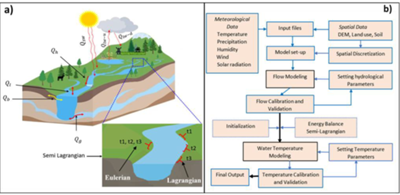CISESS Seed Grant: Developing a Basic Model Interface (BMI) for Stream Water Temperature to Enhance Water Quality Predictions in NOAA's Next Generation Water Resources Modeling Framework
April 14, 2025 11:58 AM

Figure: (a) Conceptual framework of semi-Lagrangian stream water temperature model and (b) Representation of the modeling framework.
© NOAA National Water Center
Nigus Demelash Melaku, Assistant Research Scientist, UMD/CISESS/ESSIC
Water is vital for life and is intricately connected to environmental conservation, sustainable development, and global stability. While the quantity of water is crucial, its quality is equally important. Water quality serves as a fundamental indicator of environmental integrity, and its preservation is critical for sustaining ecosystem functionality, safeguarding public health, and supporting economic activities. In the context of intensifying urbanization and expanding agricultural practices, the ability to accurately predict stream water temperature has emerged as a pivotal aspect of water quality assessment. Stream temperature significantly impacts aquatic ecosystem dynamics, influencing species composition and biodiversity, altering gas solubility (e.g., oxygen), modulating biogeochemical reaction rates, and regulating the metabolic processes of aquatic biota.
Building on prior findings in developing an advanced stream water temperature model, this project seeks to integrate our semi-Lagrangian formulation into NOAA’s Next Generation Water Resources Modeling Framework (NextGen). The goal is to improve predictions of water quality dynamics across U.S. river basins and provide actionable insights for water resource managers.
The increasing impacts of land use change on aquatic ecosystems such as higher water temperatures, thermal pollution, and shifting species distributions underscore the need for advanced, accurate tools to monitor and manage stream water quality. Our approach will enhance the understanding of these challenges and provide real-time insights into stream temperature dynamics, allowing for better decision-making under fluctuating weather conditions.
This initiative aligns with NOAA’s own support of management of water quality risks in environments impacted by flooding and prolonged inundation, as outlined in the 2023 Water Availability, Quality, and Risk challenges.
Our CISESS Seed Grant Project will develop a Basic Model Interface (BMI) for stream water temperature modules, enabling seamless integration with NOAA’s NextGen framework. Key objectives include:
-
Interface Development: Develop BMI that enables integration of the stream water temperature model with the NextGen platform.
-
Testing and Validation: Conduct rigorous testing and validation of the BMI to ensure model accuracy and reliability.
-
Real-Time Insights: Provide real-time predictions of stream temperature dynamics, offering valuable data to inform water resource management.
This project represents a strong collaborative effort, involving experts from the Cooperative Institute for Satellite Earth System Studies (CISESS) at the University of Maryland, the U.S. Army Corps of Engineers, and the National Water Center. The team will work on the development of the BMI, followed by model integration and validation phases.
This initiative represents a critical step toward advancing water quality prediction tools and supporting the management of aquatic ecosystems in an era of constant change. By improving our ability to predict stream water temperature dynamics, we hope to contribute to more informed decision-making and more effective water resource management strategies.
« Back